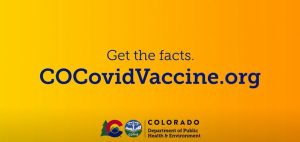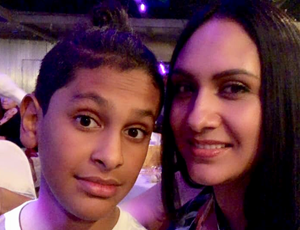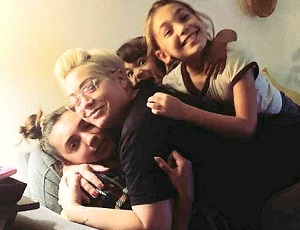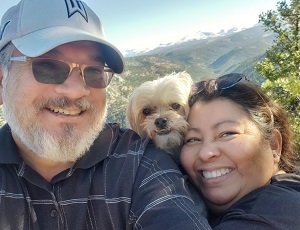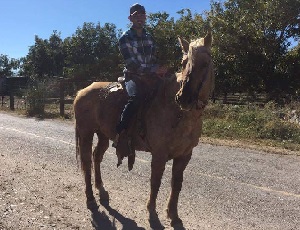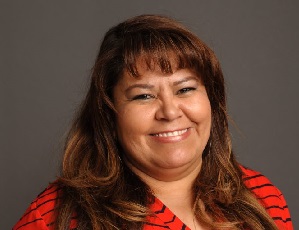COVID-19 News and Announcements
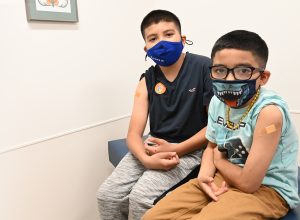 October, 2022 – COVID-19 Booster Update for People 12+
October, 2022 – COVID-19 Booster Update for People 12+
We are now giving the COVID-19 booster to eligible patients 12+. Please schedule and appointment online at https://www.clinica.org/my-appointments/ or by calling 303-650-4460.
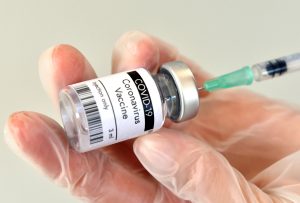 June 22, 2022 – Please note that we are transitioning to only stocking and administering the Pfizer COVID-19 Vaccine. We are no longer scheduling 1st dose Moderna vaccine appointments. We will continue to schedule Moderna 2nd doses, additional doses and boosters using our remaining Moderna supply.
June 22, 2022 – Please note that we are transitioning to only stocking and administering the Pfizer COVID-19 Vaccine. We are no longer scheduling 1st dose Moderna vaccine appointments. We will continue to schedule Moderna 2nd doses, additional doses and boosters using our remaining Moderna supply.
Why are we transitioning to only stocking and administering Pfizer?
– For the 6mo – 4 year age group, Pfizer is 80% effective while Moderna is only 50% effective.
– Pfizer provides vaccines for more age groups than Moderna (Moderna does not have a vaccine for 6 years through 17 years).
– The FDA and CDC have not stated a preference for one mRNA vaccine over another. They equally recommend both vaccines.
– The FDA has authorized the use of mix-and-match booster doses for currently available COVID-19 vaccines based on the results of a NIAID-supported study.
New CDC COVID Recommendations
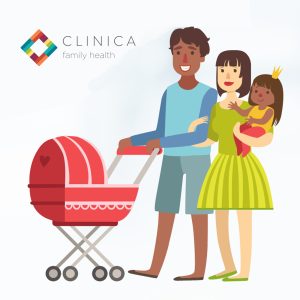 June 22, 2022 – Children age 6 months & older are now eligible for COVID-19 vaccines. The CDC recommends that all children 6 months and older get COVID-19 vaccine. Vaccination is the best way to protect our children, friends, and families from COVID-19.
June 22, 2022 – Children age 6 months & older are now eligible for COVID-19 vaccines. The CDC recommends that all children 6 months and older get COVID-19 vaccine. Vaccination is the best way to protect our children, friends, and families from COVID-19.
Make an appointment to talk to your provider and get the COVID-19 vaccine for your child today!
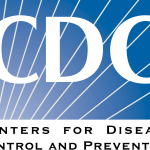
May 25, 2022 – On May 19, ACIP approved and CDC recommended a single booster dose for children ages 5-11 at least five months after completion of the primary series. Children with moderate to severe immunocompromise should receive a booster dose at least three months after their additional primary dose (third dose).
CDC also strengthened previous second booster recommendations to state that people 50 and older, and those ages 12 and older with moderate to severe immunocompromise SHOULD receive a second booster dose at least 4 months after their first booster. There has been a steady rise in cases and a sharp increase in hospitalizations in older Americans. If you haven’t had a vaccine since the beginning of December 2021 and are due for your 1st or 2nd booster, now is the time!

As of July 19, 2021 – Clinica patients who have concerns about COVID-19 or are experiencing cold or flu symptoms should schedule an appointment by calling 303-650-4460 or clicking on the “My Appointments” tab above.
If you want to be tested for COVID-19, please click on one of the links below to find free testing locations:
- For Adam, Arapahoe and Douglas Counties: https://www.tchd.org/827/Free-Testing-Sites
- For Boulder County: https://www.bouldercounty.org/families/disease/covid-19/testing/

Reliable Information About the Covid-19 Vaccination
So much information is circulating about the Covid-19 vaccines — from the media, the internet, friends and family. It can be confusing, and it’s changing fast. Here are a few of the sources that your Clinica care providers trust. If you have questions or concerns after looking at these resources, please schedule a telehealth visit with your provider so you can gather more information. If you are a patient, schedule a telehealth visit in English here. Schedule a telehealth visit in Spanish here.
Covid-19 Vaccine Documents and Forms
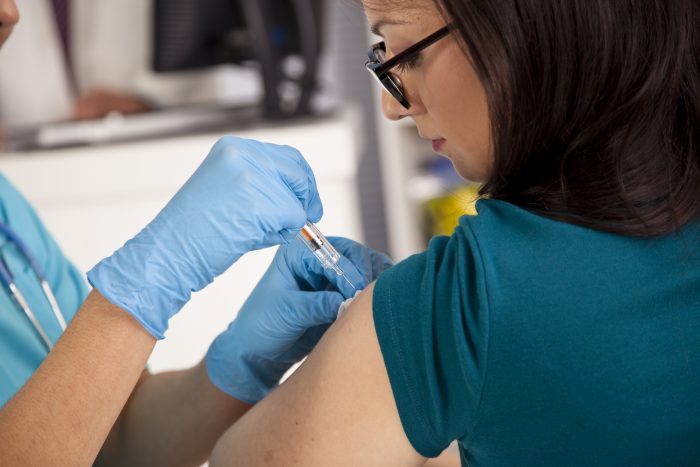
PFIZER VACCINATION CONSENT FORMS & INFORMATION
Please review these forms before your appointment.
| CDC Consent: | English | Spanish |
| Emergency Use Authorization 6 Months - 4 Years Old: | English | Spanish - Coming Soon |
| Emergency Use Authorization 6 - 11 Years Old: | English | Spanish - Coming Soon |
| Booster Information 5 - 11 Years Old: | English | Spanish - Coming soon |
| Emergency Use Authorization 12 and Older: | English | Spanish - Coming Soon |
| Pfizer COVID-19 Vaccine Frequently Asked Questions: | English | Spanish Coming Soon |
| What to Expect with a Vaccine: | English | Spanish |
| V-Safe Side Effects Tracking Information: | English | Spanish |
Covid-19 Vaccine Frequently Asked Questions
(Source: Colorado Dept. of Public Health and Environment)
CAN I GET COVID-19 FROM A VACCINE?
No. A COVID-19 vaccine will give you protection against the disease without having to get sick with the actual virus. It is not possible to get COVID-19 from a vaccine. The vaccine teaches our body how to protect against the virus. Sometimes, after the vaccine, people may have a symptom like a fever. This is a normal part of your body building protection after your shot.
HOW DO mRNA VACCINES WORK?
mRNA vaccines help our bodies build an immune response to the COVID-19 virus. The mRNA vaccine teaches our cells how to make a harmless protein that is unique to the virus that causes COVID-19. After our cells make copies of the protein, our immune system recognizes that the protein should not be in our body and builds antibodies to remember how to fight the virus if we are infected in the future.
An antibody is a protein produced by your immune system that can recognize a specific type of virus in your body. When you get infected, your body’s antibodies are able to recognize proteins on the surface of the COVID-19 virus to attack and stop it from replicating in your body.
To learn more, visit the CDC’s Understanding How COVID-19 Vaccines Work.
CAN mRNA VACCINES CHANGE MY GENES?
No. mRNA from the COVID-19 vaccine never enters the nucleus of the cell and does not affect or interact with your DNA. mRNA are naturally occurring genetic molecules that instruct our cells how to create proteins that build, maintain, and repair things in the body. Minutes after our cells make the proteins, the body destroys the mRNA using a special enzyme.
HOW CAN I BE SURE THE VACCINE IS SAFE?
The FDA requires that vaccines undergo a rigorous scientific process, including three phases of clinical trials, before they authorize or approve the vaccine. The COVID-19 vaccines are subject to the same safety standards as other vaccine trials.
WHAT ARE THE POSSIBLE VACCINE SIDE EFFECTS?
Most people who received the vaccines in clinical trials experienced mild to moderate side effects that typically go away on their own after a few days. The most commonly reported side effects for the Pfizer and Moderna COVID-19 vaccines are: pain, swelling and redness at the injection site; pain, tenderness and swelling of the lymph nodes in the arm that received the injection; fatigue; headache; muscle pain; chills; joint pain; nausea/vomiting; and fever for a few days after receiving the vaccine. Side effects are often more noticeable after the second dose. The frequency and severity of side effects may vary between the two vaccines. Also, different people may experience different side effects, even if they receive the same vaccine.
The process of building immunity can cause symptoms. These symptoms are normal and show that your body’s immune system is responding to a vaccine. Other routine vaccines, like the flu vaccine, have similar side effects. Even if you experience discomfort after the first dose of the vaccine, it is very important that you still receive the second dose for full protection.
For in-depth information about the side effects of the vaccines, click on these links to see the CDC’s report on the Pfizer vaccine and the Moderna vaccine.
WHAT VACCINES DOES CLINICA HAVE?
Clinica is offering the Moderna (2 doses) and the Johnson & Johnson (1 dose) COVID-19 vaccines.
WHY DO I NEED TWO DOSES OF THE MODERNA/PFIZER VACCINE?
The first dose introduces your body to a small, harmless protein that is part of COVID-19. It teaches your immune system how to produce antibodies and fight the virus. The second dose unleashes the full power of your antibody system to make lots of antibodies because your body now knows that this protein shouldn’t be in you. Studies show that two doses provide 94.1% protection against COVID-19. Whether you get the Moderna or Pfizer vaccine, it is important to get both of doses so you will be fully protected.
The Johnson & Johnson vaccine does not require a second dose.
WHO ARE THE VOLUNTEERS IN THE VACCINE CLINICAL TRIALS?
People volunteer to take part in clinical research studies. All study volunteers must go through a process called informed consent. Informed consent makes sure that volunteers understand all of the risks and benefits of being in a study. Volunteers may leave a study at any time without losing any of their rights or benefits.
A diverse group of people volunteered to participate in every phase of the clinical trials. About 37% of volunteers for Moderna’s trials identified as Asian, Black/African American, Hispanic/Latino/a, or other.
HOW MUCH DOES THE COVID-19 VACCINE COST?
Your COVID vaccine is free. If you have insurance, it may be billed for an administrative fee. No co-pay will be collected.
DO I NEED TO BE A US CITIZEN TO GET THE COVID-19 VACCINE?
You do not need to be a U.S. citizen. You will not need to prove lawful presence to get a COVID-19 vaccine in Colorado. Further, public health will never share your information for any immigration or law enforcement purposes.
IF I'VE ALREADY HAD COVID-19 AND RECOVERED, DO I NEED TO GET A VACCINE?
Yes. Data from clinical trials suggest that the Pfizer, Moderna, and John & Johnson vaccines are likely safe and effective in people who have recovered from a previous COVID-19 infection. The Advisory Committee on Immunization Practices (ACIP) recommends waiting at least 90 days after recovering from COVID-19 before getting the vaccine.
It is currently unknown how long natural immunity lasts after recovering from COVID-19.
Early evidence suggests natural immunity from COVID-19 may not last very long, and cases of reinfection have been reported.
ISN'T NATURAL IMMUNITY FROM HAVING COVID-19 BETTER THAN GETTING THE VACCINE?
The protection from recovering from COVID depends on the disease, and it varies from person to person. Because this virus is new, we don’t know how long natural immunity might last. Some early evidence—based on a small sample size of people—seems to suggest that natural immunity may not last very long.
Regarding vaccination, we won’t know how long immunity lasts until we have more data on how well it works over time.
Experts are trying to learn more about both natural immunity and vaccine-induced immunity of COVID-19.
DO I STILL NEED OT WEAR A MASK AND PHYSICALLY DISTANCE AFTER GETTING THE VACCINE?
Yes. It is still important to take steps to protect yourself and others. Current info suggests that it is possible that someone who has been vaccinated against COVID-19 may still have a mild or asymptomatic infection or spread the virus to others. So it is important to continue taking precautions. Continue wearing masks and practicing physical distancing until it is clear that it is safe to stop.
WHAT INFORMATION WILL I NEED TO PROVIDE TO GET A VACCINE?
Like other routine vaccinations, you will need to share some personal information with your vaccine provider when you get a COVID-19 vaccine. This information will only be used for public health purposes. It may include your name, date of birth, and contact information. Your information will remain protected. If you are eligible to get the vaccine because of the type of job you have, please bring proof of employment.
HOW WILL I KNOW WHEN IT'S MY TURN TO GET A VACCINE?
Clinica is following the guidelines set by the State of Colorado. We are reaching out to patients when they are eligible to receive the vaccine. You can always check what phase we are in at the state’s vaccine web site at https://covid19.colorado.gov/for-coloradans/vaccine/vaccine-for-coloradans.
Pregnancy and the COVID-19 Vaccine
Many people who are currently pregnant or planning to get pregnant have concerns about getting a COVID-19 vaccine. They’re worried about the impact on their baby and their overall wellness during pregnancy. Now that we are almost a year into the pandemic, we have learned a lot about how COVID-19 affects pregnant people. We have learned that:
• Pregnant people are at higher risk of complications than non-pregnant people.
• When pregnant people are hospitalized due to COVID-19, they are more likely to need intensive care or a ventilator than non-pregnant patients. (Citations 1 & 2)
• Pregnant people who are overweight or older than 35 seem to be at an even higher risk of a severe illness from the virus. (Citation 3)
• Black and Hispanic pregnant people seem to have higher rates of COVID-19 infection and death. (Citation 3)
• Preterm birth may be more common among patients infected with COVID-19. (Citation 4)
Given what we now know about the virus, it is very important that pregnant people receive a vaccine. Even though the vaccine studies did not include pregnant people, a small number of participants learned they were pregnant after receiving the vaccine, and none of these people had miscarriages. The mRNA COVID vaccines prevent about 95% of infections. Getting a vaccine will help prevent you from getting COVID and may reduce the chance that you pass it to people around you, like your family.
Breastfeeding and the COVID-19 Vaccine
There is no data on the safety of COVID-19 vaccines in lactating people or how it might impact milk production. Additionally, there is no information on how the vaccine might impact a nursing baby. However, the CDC recommends that if a breastfeeding individual is at risk for COVID-19, they should get a vaccine.
Fertility and the COVID-19 Vaccine
People who are trying to become pregnant can safely receive the vaccine. There is no evidence that fertility is impacted by the COVID-19 vaccine. Nor do people need to take a pregnancy test before getting the COVID-19 vaccine.
Sources:
1. DeBolt CA, et al. Pregnant women with severe or critical COVID-19 have increased composite morbidity compared to
non-pregnant matched controls. Am J Obstet 2020 Nov doi: 10.1016/j.ajog.2020.11.022
2. Centers for Disease Control and Prevention. Update: Characteristics of Symptomatic Women of Reproductive Age with
Laboratory-Confirmed SARS-CoV-2 Infection by Pregnancy Status — United States, January 22–October 3, 2020.
November 2020:1-7.
3. ACOG Practice Advisory: Vaccinating Pregnant and Lactating Patients Against COVID-19 (December 2020)
4. MMWR: Birth and Infant Outcomes Following Laboratory-Confirmed SARS-CoV-2 Infection in Pregnancy — SET-NET, 16 Jurisdictions, March 29–October 14, 2020.
For more information from the CDC, please click the link below:
https://www.cdc.gov/coronavirus/2019-ncov/vaccines/recommendations/pregnancy.html
Why We Got the Vaccine
There are a lot of reasons to get your COVID-19 vaccine. Read about real people in your community who have gotten their vaccine. They had their reasons, what will yours be?
View our gallery of Celebrities who have gotten the vaccine here.
Information for Sick Patients
CALL FIRST
If you are experiencing coronavirus symptoms, please call us at (303) 650-4460 before coming in to one of our clinics. Patients can click here to schedule their own appointments. Non-patients can request an appointment by clicking here. We will call you back two business days. If your health changes, or if you experience anxiety due to the coronavirus outbreak, please call us at (303) 650-4460.
SYMPTOMS OF CORONAVIRUS
- Cough
- Fever
- Shortness of breath
WHAT TO DO IF YOU THINK YOU ARE SICK
- Cover your cough
- Isolate yourself from others
- Drink plenty of fluids
- Call us at (303) 650-4460
You can self-check your symptoms to see if you should get a test for the coronavirus or contact your primary care provider. Click the button below to take the self-check assessment.
Some of our entrances have changed. When you arrive at the clinic, you need to go through a screening process and be directed to the right door. Before you park, please look for the signs directing you to the person who can help you. Due to this extra step, please arrive 20 minutes before to your appointment.
Required Screenings & Masks
When patients arrive they will be screened at the entrance and will be provided a mask, which is required while inside the building. Children under the age of 2, anyone who has trouble breathing or anyone who is unconscious, incapacitated or otherwise unable to remove the mask without assistance are exempt from this rule.
Visitor Limits
To keep everyone safe, access to the building is limited to patients with a scheduled appointment and those essential for the patient’s well-being and care (e.g., care partner, parent). Anyone else who comes with you to the visit will be asked to wait outside the building or in their car. Both patients and caretakers or parents will be screened at the entrance to the building and provided a mask, which is required while inside the building. Alternative mechanisms for patient and visitor interactions such as video-call applications on cell phones or tablets are highly encouraged. Ask staff for the current WIFI password.
COVID Pre-Screening Questions
Please answer the following questions completely. Answering “yes” is okay. If you answer “yes” to any of these questions, please call 303-650-4460 to discuss which type of appointment is most appropriate for you.
1. In the last 14 days, have you been:
- Tested for or diagnosed with COVID-19
- Exposed to COVID-19 (been within 6 feet of someone with the virus for at least 10 min)
- Asked to quarantine because of COVID-19
- Living in the same house with someone who has or might have COVID-19
2. In the last 72 hours, have you had:
- Cough
- Shortness of breath or difficulty breathing
- Fever or chills
- Congestion, runny nose or sore throat
- Headache
- Abdominal pain, diarrhea, nausea or vomiting
- New loss of taste or smell
- Muscle or body aches or unusual tiredness
- A usual cough or tiredness that has gotten worse over the last two weeks
How to Isolate
Isolation and quarantine help protect the public by preventing exposure to people who have or may have a contagious disease like the coronavirus.
Isolation separates sick people with a contagious disease from people who are not sick. Do not go to work, school or public areas. Also, avoid using public transportation, rideshares or taxis. Stay home except to get medical care.
Quarantine separates and limits the movement of people who have been exposed to a contagious disease to see if they become sick.
Who Should Isolate?
• Have a positive COVID-19 test.
• Have symptoms of COVID-19 (coughing, shortness of breath and/or fever).
• Are getting ill and think they might have COVID-19.
How to Isolate
• Do not go to work, school or public areas. Also, avoid using public transportation, rideshares or taxis. Stay home except to get medical care.
• Separate yourself from other people and animals in your home.
• Stay in one specific room and away from others in your home as much as possible.
• Use a separate bathroom if possible.
• Have another member of your household care for your pets. If you must care for your pet, wash your hands before and after contact with them.
• If possible, wear a facemask when you are around other people or pets and before you enter a health care provider’s office. If you are not able to wear a facemask, then people who live with you should not be in the same room with you or they should wear a facemask if they enter your room.
How Long You Should Isolate
• Until you have had no fever for at least 72 hours (three full days of no fever without using medicine that reduces fevers) AND
• Other symptoms have improved (any cough or shortness of breath have improved) AND
• At least 7 days have passed since your symptoms first appeared
Where Should You Isolate?
Your home is the best place to isolate.
Other Information
• If you have a medical appointment, call ahead and let the staff know you have been diagnosed with COVID-19 or have COVID-19 symptoms. They will tell you what to do.
• Monitor your symptoms. If your symptoms worsen (e.g., difficulty breathing) or if you are in a higher risk group because you are older than 60 or have a chronic illness, call a health care provider or nurse line to find out what to do.
How to Quarantine
Who Should Quarantine
Anyone who has been in close contact with a person who has tested positive for the coronavirus or has symptoms.
How to Quarantine
Stay at home or in one location for 14 days.
How Long You Should Quarantine
14 days
Where You Should Quarantine
Stay home or stay in one location.
Other Information
People can leave their quarantine to seek medical treatment. Call ahead and let staff at the health care facility know you are under quarantine (either by order or self-imposed) for COVID-19, so the office can take steps to protect other people. Call your provider or clinic first to get instructions before going to the health care office, hospital or urgent care. If you have a medical emergency, tell the 911 dispatcher you are under quarantine for COVID-19. Otherwise:
• Restrict activities outside your home.
• Do not go to work, school, or public areas.
• Avoid using public transportation, rideshares, or taxis.
If you get sick and your illness is mild, you may be able to isolate and recover at home without seeing a medical provider. If your symptoms worsen or if you are in a higher risk group because you are older than 60 or have a chronic illness, call a health care provider or nurse line to find out what to do.
CALL FIRST
If you are experiencing coronavirus symptoms, please call us at (303) 650-4460 before coming in to one of our clinics. Patients can click here to schedule their own appointments. Non-patients can request an appointment by clicking here. We will call you back two business days. If your health changes, or if you experience anxiety due to the coronavirus outbreak, please call us at (303) 650-4460.
SYMPTOMS OF CORONAVIRUS
- Cough
- Fever
- Shortness of breath
WHAT TO DO IF YOU THINK YOU ARE SICK
- Cover your cough
- Isolate yourself from others
- Drink plenty of fluids
- Call us at (303) 650-4460
Cleaning refers to the removal of germs, dirt, and impurities from surfaces. Cleaning does not kill germs, but by removing them, it lowers their numbers and the risk of spreading infection.
Disinfecting refers to using chemicals to kill germs on surfaces. This process does not necessarily clean dirty surfaces or remove germs, but by killing germs on a surface after cleaning, it can further lower the risk of spreading infection.
- Clean and disinfect high-touch surfaces daily in household common areas (e.g. tables, hard-backed chairs, doorknobs, light switches, remotes, handles, desks, toilets, sinks).
- In the bedroom/bathroom dedicated for an ill person: consider reducing cleaning frequency to as-needed (e.g., soiled items and surfaces) to avoid unnecessary contact with the ill person.
- As much as possible, an ill person should stay in a specific room and away from other people in their home, following home care guidance.
The caregiver can provide personal cleaning supplies for an ill person’s room and bathroom, unless the room is occupied by child or another person for whom such supplies would not be appropriate. These supplies include tissues, paper towels, cleaners. - If a separate bathroom is not available, the bathroom should be cleaned and disinfected after each use by an ill person. If this is not possible, the caregiver should wait as long as practical after use by an ill person to clean and disinfect the high-touch surfaces.
How to Clean and Disinfect
Wear disposable gloves when cleaning and disinfecting surfaces. Throw away the gloves after each cleaning. If you use reusable gloves, they should only be used for cleaning and disinfection of surfaces for COVID-19. Clean hands immediately after gloves are removed.
Clean dirty surfaces using a detergent or soap and water before you disinfect them.
To disinfect, you can use diluted household bleach solutions or alcohol solutions with at least 70% alcohol. Follow manufacturer’s instructions for application and proper ventilation. Make sure the cleaner is not past its expiration date. Never mix household bleach with ammonia or any other cleanser. Unexpired household bleach will be effective against coronaviruses when properly diluted.
Prepare a bleach solution by mixing:
5 tablespoons (1/3rd cup) bleach per gallon of water or
4 teaspoons bleach per quart of water
For soft or porous surfaces such as carpeted floor, rugs, and drapes, remove visible contamination if present directed by the manufacturer. If possible, wash items using the warmest appropriate water setting for the items and dry items completely.
Washing the Laundry
If possible, wear disposable gloves when handling dirty laundry from an ill person. Throw away immediately. If using reusable gloves, those gloves should only be used for cleaning and disinfecting the area around a sick person. Do not use them for any other purpose. Wash hands immediately after gloves are removed. If you don’t have gloves, be sure to wash your hands immediately after handling the laundry.
Do not shake dirty laundry. Shaking could release the virus into the air.
Wash items as instructed by the manufacturer. Wash using the warmest appropriate water setting for the items and dry items completely. Dirty laundry from an ill person can be washed with other people’s items.
Clean and disinfect clothes hampers according to the above information. If possible, consider putting a disposable or washable bag liner in the hamper.
Hand Washing and Other Preventive Measures
Household members should wash hands often, including right after removing gloves and after contact with an ill person. Wash hands with soap and water for 20 seconds. If soap and water are not available and hands are not visibly dirty, an alcohol-based hand sanitizer that contains at least 60% alcohol may be used. However, if hands are visibly dirty, always wash with soap and water.
Household members should avoid touching their eyes, nose, or mouth with unwashed hands. People should wash their hands:
- After blowing one’s nose, coughing, or sneezing
- After using the restroom
- Before eating or preparing food
- After contact with animals or pets
- Before and after providing routine care for another person who needs assistance (e.g. a child)
The sick person should eat or be fed in their room if possible. Non-disposable food service items used should be handled with gloves and washed with hot water or in a dishwasher. Remember to wash your hands after handling dirty dishes.
Have the sick person use one trash can that has a liner in it. Wear gloves when removing garbage bags or throwing away trash. Wash your hands after handling or disposing of trash.
Information for Healthy Patients
All of our clinics are open and seeing patients for all types of visits. We have implemented some new policies to ensure the health and safety of our patients and staff. Please make sure to read the COVID screening requirements, prior to your next in-office appointment.
We are also offering telehealth services to patients who prefer to receive care that way. Clinica patients can schedule either in-person or telehealth appointments by clicking here.
Basic flu-prevention techniques will help you avoid the coronavirus. We recommend that you:
- Avoid close contact with people who are sick.
- Wash your hands with soap and water regularly.
- Use alcohol-based hand sanitizers if you can’t wash your hand.
- Don’t touch your eyes, nose and mouth with unwashed hands.
- Stay home if you are sick (and keep sick children home from school).
- Cough or sneeze into a tissue or your elbow. If you use a tissue, wash your hands afterwards.
- Clean and disinfect frequently touched objects and surfaces.
